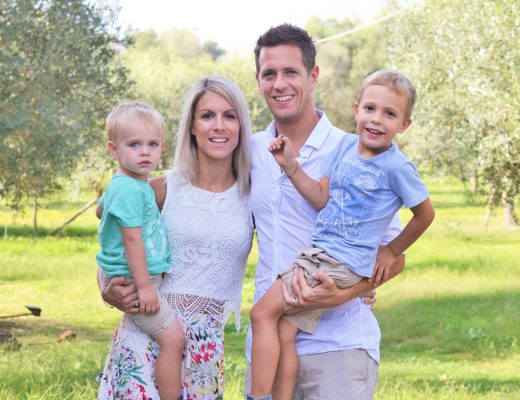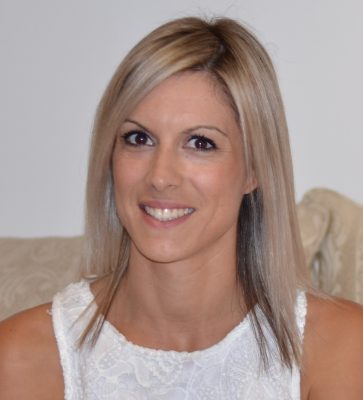By: Chontelle Bonfiglio

“Mummy, how do you say caterpillar in Spanish?” asks my four year old. Something I never thought I would ever hear. I don’t speak Spanish, and had to quickly send his teacher a voice message to ask her! I actually had to translate it into Italian so she could understand me, then wait for her reply to let us know what it means in Spanish. My son would not go to bed until he knew the answer. He is a curious little one and very stubborn.
How did we get here? Well, I am Australian and actually grew up only speaking English. I never really learned about the benefits of bilingualism until later in life. It wasn’t until I moved overseas and started travelling, that I met many people who spoke different languages, and realised that I was actually the minority.
I travelled around a lot teaching English to children and to be honest, I wasn’t expecting it to be so easy. It wasn’t like teaching teens or adults, preparing lessons and explaining grammar. Simply spending time with them playing, and talking to them helped to naturally acquire the language. They learned so much so quickly, even if English was their second, third, or even fourth language. I realised then, that I wanted to raise bilingual kids myself.
At that point though, I hadn’t yet met my husband, and had no clue how I would teach my future children another language since I was monolingual myself. I guess I just got lucky that I married a foreigner.
My husband is Italian, we actually met randomly in Malta while I was travelling around Europe. I was supposed to go home shortly after, however plans changed, and now almost ten years later I am still here, living with him in Italy. We have two young children who we are raising bilingually, speaking English and Italian. They are also learning Spanish as a third language, which neither of us speak.
Our Family Language Model
We follow the OPOL method where I speak only English, and my husband speaks only Italian, even though we both understand and speak each other’s languages. We spoke English together initially, as I didn’t speak Italian when we met. However, living in Italy, I have learned over the years. Now we speak a mix of both between us. We don’t usually mix with our children though.
We decided to add a third language, Spanish, just before our eldest turned three as he had a good grasp of Italian and English and only felt natural since I have a keen interest in languages and multilingualism. I thought, the more the merrier right?
How we manage our kids language exposure
We manage the three languages in our household quite well. We live in a small town in Italy, so Italian is the language our children get the most exposure too. I don’t worry too much about their Italian, I let their family and pre-school take care of that.
I spend a lot of one on one time with my kids, so they also speak English to a native level, almost as good as their Italian. Since I have been very strict with my children from birth, they have always spoken to me in English, to the point they will laugh at me if I speak Italian with them. I guess that’s a good thing!
We have a Spanish speaking playmate/babysitter who has been coming a few afternoons per week for the past year and a half. We continue the OPOL approach with her, and asked her only to speak Spanish with our kids. My four year old can now hold a good conversation in Spanish, and my two year old can count and sing songs. For the amount of exposure they get, I would say they are doing quite well. The main reason, is that we are consistent and do not mix languages.
Our family challenges
Since we don’t speak Spanish ourselves, this is one of our greatest challenges. Spanish is the language with the least exposure and we try to provide as many outside resources as possible. I have countless books, dvd’s, and flashcards, and we are trying to learn some of the language ourselves so that we can support our kids eventually.
We use screen time to our advantage for their language exposure allowing them only to watch TV in Spanish or English. My son has clicked on, that if he asks to watch something in Spanish, I am more likely to say yes and he uses that to his own advantage!
In regards to English, my four year old has started to read and write. He has had a keen interest for a while, so I have been spending time with him teaching the letters and sounds. He has a real thirst for learning, and picked it up quite naturally. Now he has started learning in Italian and Spanish and not all of the letter sounds are the same, so he is learning the differences between them.
The need for adapting our language strategy
While we live in Italy now, we will most likely move to Australia in the near future, which will change our situation completely. The community language will change to English, and Italian will become a minority language. As my husband works long hours, I spend more one on one time with my kids, which could be a problem. I am worried that their Italian will suffer so we may need to evaluate our language strategy. I hope that by the time we move, that my Italian is good enough to speak with my kids, and that they will allow me to. Until now, I have only spoken with them in English, so I am not sure if they will accept the change.
We hope to continue with their Spanish as we do now. I realise that while I am confident that they will grow up fully proficient in English and Italian, that we will have to make an extra effort with Spanish, and we are up for the challenge.
Will we add another language?
When we introduced Spanish, I was actually looking for someone to teach my kids Mandarin. I searched for months, however because we live in a small town, finding anyone who spoke any second language was difficult as it was. So, when I randomly found a Spanish speaker who was willing to come play with my kids and teach them to speak Spanish, I took full advantage, and unfortunately had to let go of the idea of them learning Mandarin. In my mind, any new language was better than none.
Since in Australia, there should be more opportunities to find a Mandarin speaker, it is not out of the question and we will still consider it, especially as our children are young. I have seen how easily they have taken to Spanish, and I have no doubt that they would have the same interest in another language. I realise that they might not become fully proficient in all four, but I am hopeful.
Advice for other families raising kids with multiple languages
Make a family language plan:
Choose a language strategy and be consistent. But don’t be afraid to change it if things aren’t working, or if your situation changes. As I mentioned, we have been very strict with OPOL, however we are aware that we may need to change to Minority Language at Home in the future to make sure our kids get adequate exposure to Italian.
Make language exposure a priority:
Ensure there is a need for your kids to speak each language. Give them a reason for them to have to speak it. If they don’t need to speak a language, why will they? A person is the easiest option, someone that they need to use the language with.
Provide necessary resources:
Resources are necessary especially for the minority language, and if you don’t speak the language they are learning. Make sure that you have lots of books, music and media that they can take advantage of. It doesn’t have to be expensive, there are many different language resources online that are easily printed off.
Learn languages together:
Make an effort to speak your partners language if you don’t already, it will make it a lot easier having family conversations. I never spoke Italian until my first son was born. I made a conscious decision to learn, because I was worried that I would be left out of conversations. If your child is learning a language you don’t speak, it is in your best interest to at least learn the basics.
Make languages a natural part of your every day life:
Try not to stress too much about everything, try to make it feel as natural as possible. Make sure there is the need to use their languages every day, and that they have enough practice and exposure to each language they are learning. But most of all, make it enjoyable, children learn best when they are having fun.
Thank you, Chontelle! Chontelle Bonfiglio is a certified ESL teacher, writer, and creator of Bilingual Kidspot, a website offering practical advice for parents raising bilingual or multilingual children. She is also a mother of two bilingual children. You can follow her on Facebook, Twitter, or see her bilingual parenting website.

Years ago my husband and I were befriended by a couple who were using the One Parent, One Language system with their children, and found it effective. They wanted to avoid a situation where the children would mix languages because they did not have sufficient vocabulary and familiarity in either language to express themselves.
It was great to know a successful family story. Thank you for sharing with us.